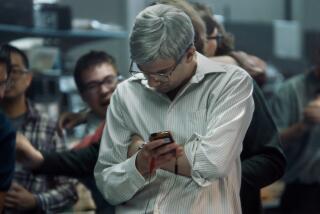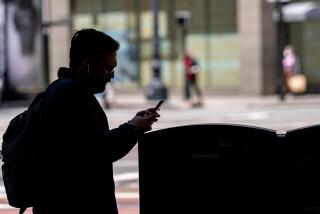Who’s the boss: you or your BlackBerry?
- Share via
“We are in great haste to construct a magnetic telegraph from Maine to Texas,” Henry David Thoreau wrote in “Walden,” which was first published 150 years ago. “But Maine and Texas, it may be, have nothing important to communicate.”
Thoreau would be astonished at just how much information we have to communicate a century and a half later. How much of it is actually important remains a question.
In 2002, human beings worldwide created 5 exabytes of new information in print, film, magnetic and optical storage media, an increase of 33% from 1999, according to a 2003 UC Berkeley study conducted to estimate the annual size of the stock of new information. How much is 5 exabytes? It’s the equivalent of the information contained in 37,000 new Libraries of Congress, of which the current one (and only) holds 17 million books. And that figure doesn’t take into account e-mail sent in 2002. That’s enough to fill 2,300 more Libraries of Congress.
Having access to such an overwhelming amount of information comes at a cost to businesses and the people who travel for them -- and it’s not just in dollars.
The capital investment in technology alone is staggering. In total, businesses in the U.S. have been spending about $400 billion a year since 1999 on information-processing equipment and software -- or about $2 trillion in the last five years, according to the U.S. Bureau of Economic Analysis.
Technology like the telegraph and innovations since have enabled a communications and information explosion unimaginable in Thoreau’s day. And to manage and access all that information begat by technology is, well, more technology. Gadgets. Instant access. Business communications tools. PDAs. The BlackBerry.
Research conducted for Research in Motion, the Toronto-based manufacturer of the BlackBerry, found that the average user “recovers” about an hour of downtime every day by using the BlackBerry.
The gods of technology can help you be more productive, impress the boss, land big clients, get big bonuses. Can your business or career afford not to be in constant touch with the gods?
“You must live in the present, launch yourself on every wave, find your eternity in each moment,” Thoreau wrote. Walden Pond is today in cellphone range.
People were “BlackBerrying” one another on the floor of the national conventions in Boston (about 15 miles as the crow flies from Walden Pond) and New York.
“What we see is the use of BlackBerry absolutely mirrors the user’s personality and habits,” said Mark Guibert vice president of corporate marketing at RIM. “Individuals who are Type As, that are very driven, who want instant communication, that’s how they use the device. Others choose a more casual way, using the BlackBerry so they don’t need to log in via their PC to check their e-mail.”
Whether you’re frenzied or just fretful about what’s going on while you’re away, the BlackBerry is one of the hottest “I don’t know how I ever did my job without it” gadgets on the market. Just how hot is hottest? The total number of BlackBerry subscribers increased in the second quarter of 2004 from the previous quarter by about 270,000 to 1.34 million subscribers. That’s a 25% increase in just three months.
This wireless, all-in-one personal digital assistant, cellphone and e-mail and corporate Intranet access provider is billed as “the ultimate communication tool for mobile professionals” and retails for about $500 for the latest model (less with a wireless service agreement that starts at about $40 a month). And you’re not cut off from destinations abroad; this equipment works on the same networks as cellphones, so any PDA with tri-band GSM technology will work abroad as well as in North America.
The early models -- those from just a couple of years ago when they were used mostly for e-mail -- looked like a beeper with a tiny keyboard. Now it does just about everything but shake a client’s hand.
Now the question becomes: How much is too much?
“Technology has enabled us to multitask beyond our point of functionality,” said Dr. Michelle Weil, a clinical psychologist, consultant and author of “Technostress,” a book on the effects of technology on human beings. “I call that multitasking madness.”
In our highly competitive and technology-driven society, the pressure to adopt the latest gadgets to stay at the top of our game is overwhelming.
“There is this expectation that because it exists, therefore I should have one of the things,” Weil said.
But the pressure of being in touch, squeezing every moment of work into a 24-hour period, takes a toll on quality of life and productivity. You may think you are becoming more productive by answering e-mails on the train ride home, but your productivity may be better served by just staring out the window, said Weil. “Our physiological systems are wound up higher than ever before trying to keep up. We’re sleeping less, our memory is being affected, we’re waking up in the middle of the night worried, we forget what we are saying in the middle of sentences, we lose our train of thought. It’s taking a toll,” she said.
And that toll is “less productivity and less efficiency,” the very things that technology is said to heighten.
Yet there is no clear measure of how and whether technology actually drives productivity. “Despite the massive infusion of information technology into the information workplace, a flowering of productivity never fully materialized for the majority of the workforce; or if that transformation did occur, we cannot measure or document the change,” according to a 2003 research compendium written by the Information Work Productivity Council, an independent group of companies and academics studying the issue of information work productivity and profitability.
The industry sponsors of the productivity council include such tech heavyweights as Hewlett Packard, Microsoft, Intel, Cisco Systems and Xerox.
Technology is firmly ingrained, of course, but “we have to assert ourselves by setting boundaries,” Weil said. “In an odd kind of way, we have allowed tech to take on a life of its own. We need to stay the driver.”
She suggests simple remedies, like sleeping on that flight to China rather than booting up the laptop the minute you sit down, spending unplugged time outdoors walking the dog or appreciating nature. “We have natural body rhythms that used to be connected to nature,” she said. “We woke up when the crows crowed and went to sleep when the sun went down or shortly thereafter. Technology can work 24/7, but our bodies weren’t made to work 24/7.”
Staying connected to the natural world is something that Thoreau was trying to tell us 150 years ago. It seems that the introduction of the telegraph hasn’t done much to change that wisdom. But it is something that should be of interest to both Maine and Texas.






